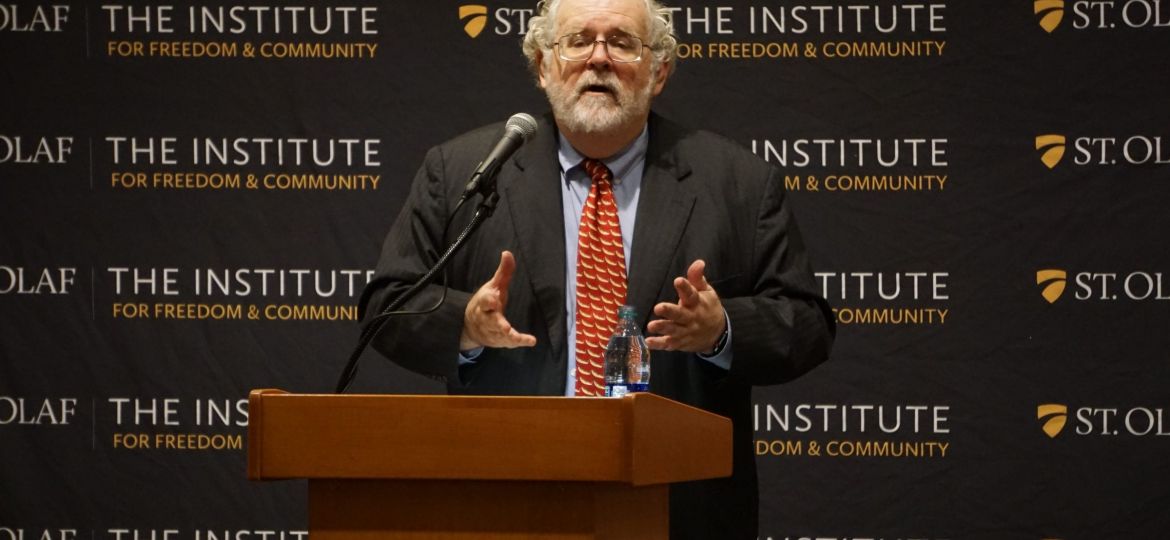
The Institute for Freedom and Community (IFC) welcomed historian and public intellectual Walter Russell Mead to the Viking Theater on Oct. 30.
Mead presented two lectures to spectators. His first lecture, titled “History, American Greatness, and the State of Israel,” was presented in the late afternoon and examined the United State’s unique relationship with the Israeli nation. His second lecture, “Examining ‘America First’: Nationalism and Jacksonian Democracy in the 21st Century,” was held in the evening and featured an open-forum discussion of U.S. nationalism and Mead’s idea of modern Jacksonian democracy.
These two sessions were included as part of the IFC’s Fall Series on “Patriotism, Nationalism, and the Idea of America.” Mead was the second speaker in the series, following David Brooks’ talk at Boe Memorial Chapel on Sept. 24. The final event in the series will be given by St. Olaf alumnus R. Eugene Parta ’62 on Nov. 15.
Mead is the current James Clark Chance Professor of Foreign Affairs at Bard College. He has published four books, with a fifth titled “The Arc of A Covenant: The United States, Israel, and the Fate of the Jewish People” set to release in 2021. As a foremost historian on American foreign policy and international relations, Mead has found special interest in his idea of “Jacksonian democracy,” as expanded upon in his second book, “Special Providence.”
In the first of the two talks offered by Mead, the historian lectured on the current state of Israel and how the nation fits into modern American foreign policy values. Elaborating on ideas expressed in his upcoming book, Mead centered his message around the shifting value of Israel through both a middle eastern and western perspective. Mead offered insights into the Israeli-Palestinian conflict and the ongoing refugee crisis. When asked about how he would approach the situation, Mead situated himself an “ideologous two-stater,” defining a “two-stater” as someone who favors the creation of two separate states in Israel, one Israeli and one Palestinian.
The second talk was an open-forum discussion revolving around Mead’s idea of Jacksonian democracy and modern U.S. nationalism, in which the IFC director Edmund Santurri sat down and prompted Mead with a series of questions. Audience members asked questions about Mead’s role as a modern historian and his views on the current U.S. government.
Many of the questions revolved around President Donald Trump and Mead’s interpretation of him. Mead offered an explanation for the election of Trump, citing Trump’s populism as a response to “regular” politicians.
Mead was able to offer an analogy to help describe the election of Trump.
“You don’t have to be calculus whiz to throw a great pitch in baseball,” Mead said. “Trump has struck out a surprising amount of batters.” There is, as Mead would describe, a method behind Trump’s election and presidency.
When asked about the significance of Trump, Mead stated simply, “we have to study [Trump].” Mead expanded upon this statement by explaining the importance of patterns and that it is possible for a historian to observe in Trump a multitude of patterns within the scope of U.S. politics.
Spectators in the room were eager to hear Mead talk about his role as a historian and why it is important in the modern day.
“You have to put a lot of effort into understanding people who are different from you,” Mead said. This is, as Mead described, the “historian context” of life, one in which Mead urged the audience to find appreciation.
Mead offered another understanding of the role of historians.
“History is an ocean; you are a person on the shore,” Mead said. “History is a raw, unprecedented abyss. It is important to try and make sense of it all.” This is especially relevant, Mead said, when looking from a foreign policy perspective.
Mead’s ideas of history and Jacksonian democracy not only interested the audience but also professors at St. Olaf.
Professor Joshua Anderson, visiting assistant professor of political science with an emphasis on race and ethnic studies, shared his insights into Mead’s work.
“Mead is interesting as he divides nationalism into several different archetypes,” Anderson said. “Mead hints at the idea that the birth of Jacksonianism is a shift in the paradigm of the Democratic party.”
This idea of Jacksonianism has caused speculation among historians and political scientists alike, and Anderson was able to offer some insights into why Mead’s view of Jacksonianism could be problematic.
“What makes Mead curious is that he wants to glorify these characteristics, whereas others have looked to criticize,” he said. “Mead has often glossed over the problems of race as a deep rooted foundation of Jacksonian democracy.”
Anderson has found a flaw in Mead’s reasoning as the world becomes more racially intertwined and diverse.
“Jackson believes that this notion of different peoples will always be evident. Jackson and fellow Jacksonians have embraced this idea of race, consciously or unconsciously,” Anderson said. “There seems to be something appealing about Jacksonianism. Mead offers no thoughts on how to understand democracy in a diverse racial world.”

